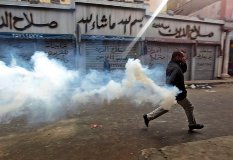Violent anti-government riots in Egypt and a grassfire of unrest torching across the sands of the Middle East fueled fears of $200-a-barrel oil and an instability some say could spread to oil-rich Saudi Arabia, and beyond.
Police Friday clashed with tens of thousands of protesters in Cairo and Alexandria. Shortly after 11 a.m. ET, as a government-ordered curfew took effect, CNN carried pictures of dozens of military trucks and armored vehicles loading police and leaving downtown Cairo as Egyptian army regulars moved in.
“We have yet to see if they will take the place of the hated Egyptian police who have cracked down so violently,” CNN correspondent Ben Wedeman reported from Iraq before his communication was disrupted. The government had responded to the “day of rage” by pulling the plug on telephone and Internet links, so protesters could not communicate.

The wave of unrest in the Middle East that began with the Jasmine Revolution is now having repercussions around the globe.
After the recent fall of governments in Tunisia and Lebanon, angry marches in Yemen, and the brutal crackdown in Egypt that has left seven dead and hundreds wounded, analysts worry that the governments of Algeria and Jordan could be next to see disturbances.
Radical extremists see the turmoil as their opportunity to institute the region-wide, anti-Western Muslim caliphate or union that they have dreamt of for centuries.
Some analysts believe Morocco also could be at risk, as well as the kingdom of Saudi Arabia, a key U.S. ally in the war on terror that boasts the world’s largest oil reserves.
The financial impact of the uprising in Egypt has already begun to ripple around the globe. Middle East currencies are under attack by speculators, the Egyptian equities market and emerging-market stocks have nosedived. But the big question for the West is what will happen to Saudi Arabia, which like Yemen and Egypt has been under pressure from radical, anti-American extremists.
“If this spreads, democracy in the Middle East spreads, the United States could take a huge hit,” predicted CNBC’s Erin Burnett on MSNBC’s Morning Joe program Friday morning. “Because democracy in a place like Saudi Arabia, you've talked a lot about who might come into power, what that means for oil prices — they're going to go stratospheric."
The Obama administration is already taking heat from both sides of the aisle for its policy of avoiding any public confrontation with Middle East regimes over their abysmal record of repression, torture, and corruption.
Unlike the Bush administration, which made a public push for democratization, the president has preferred to express its concerns in a more low-key manner.
For example, early in the Obama administration when Secretary of State Hillary Clinton was asked if Mubarak’s human rights record would be an obstacle to normal relations, she replied: "It is not in any way connected," Clinton replied. "I really consider President and Mrs. Mubarak to be friends of my family. So I hope to see him often here in Egypt and in the United States."
Human rights activists have criticized the administration in recent days for praising the “stability” of the Mubarak administration, and its usefulness to U.S. interests.
Some even charge Mubarak has misread those remarks as tacit U.S. permission for him to exact a harsh crackdown on his own people. Vice President Joe Biden went so far Thursday on PBS NewsHour as to say Mubarak should remain in power, while being more responsive to the needs of his people.
Asked by host Jim Lehrer if Mubarak, who has ruled for 30 years, could be called a dictator, Biden replied: “Mubarak has been an ally of ours in a number of things. And he’s been very responsible on, relative to geopolitical interest in the region, the Middle East peace efforts; the actions Egypt has taken relative to normalizing relationship with — with Israel . . . I would not refer to him as a dictator.”
President Obama on Thursday urged both sides to behave peacefully, and said Mubarak should not cut off Internet and telephone access to his own country in an effort to disrupt protesters’ social networking.
But on Friday morning, Mubarak’s forces did just that. They also directed a water cannon at Egyptian Nobel Peace Prize winner Mohammad ElBaradei, who has sided with the protesters and proclaimed the existing regime is “on its last legs.” Also it was reported that ElBaradei had been placed under house arrest.
Obama is taking political fire on the matter from what he no doubt considers unlikely quarters. Washington post deputy Editorial Director Jackson Diehl penned a column warning Obama’s embrace of Mubarak’s regime “may be remembered as one of the most shortsighted and wrongheaded policies the United States has ever pursued in the Middle East . . . adding the administration’s first mistake was that “it assumed that the damage done to relations by George W. Bush’s ‘freedom agenda’ was a mistake that needed to be repaired.”
As night fell Friday and government troops patrolled the city, some Egyptian protesters went home to their wounds. But most of the protesters continued their rallies. Fires still burned in the streets like beacons, and Egyptian tanks rumbled through the night.
© 2026 Newsmax. All rights reserved.